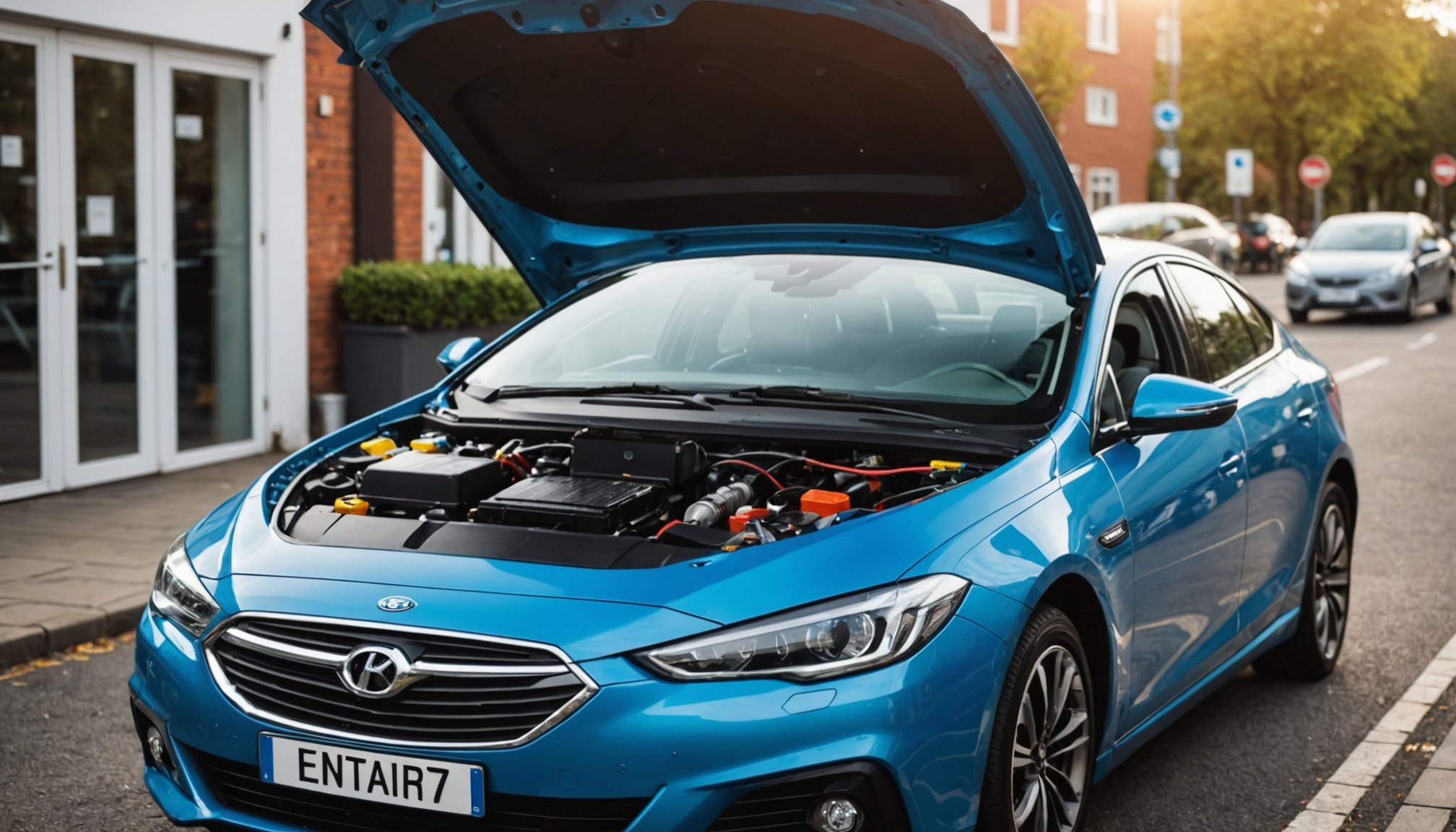Understanding Hybrid Car Batteries
Hybrid car batteries are essential components of hybrid vehicles, playing a crucial role in their operation and efficiency. These batteries come in various types, each with distinct functions tailored to different hybrid technology. Understanding how these batteries work can help in managing them effectively.
The primary battery types found in hybrid vehicles are Nickel-Metal Hydride (NiMH) and Lithium-Ion. NiMH batteries are known for their reliability and are commonly used in older hybrid models. In contrast, Lithium-Ion batteries offer a better power-to-weight ratio, making them the preferred choice for newer generations, thanks to their higher energy density and efficiency.
Additional reading : Ultimate guide to car exterior detailing: essential strategies for achieving concours d”elegance success in the uk
Numerous factors affect the lifespan of a hybrid car battery, such as driving habits, maintenance practices, and environmental conditions. Regular maintenance and mindful driving can significantly extend battery life. Understanding these elements ensures a longer battery lifespan and optimises the vehicle’s overall performance.
The importance of battery chemistry cannot be overstated. A comprehensive knowledge of how these batteries function can aid in proper care and handling. This understanding helps owners make informed decisions, ensuring their hybrid vehicles remain efficient and cost-effective in the long run. It’s a wise investment in driving sustainability and efficiency.
Also to discover : Key considerations for choosing car anti-theft devices in urban uk environments
Maintenance Practices for Longevity
Proper battery maintenance is essential for ensuring the longevity of hybrid car batteries. One of the key practices involves routine checks to identify any early signs of wear or potential issues. Regular servicing by professionals helps in maintaining optimal performance.
Effective charging practices play a significant role in extending battery life. Avoiding frequent deep discharges and keeping the battery charged between 20% to 80% can prevent battery degradation. It’s crucial to follow the manufacturer’s guidelines for charging locations and practices, as some batteries are sensitive to overcharging or high voltage input.
Incorporating routine vehicle inspections into your maintenance schedule can immensely benefit battery health. These checks not only identify problems early but also verify that the charging system is functioning correctly. Ensuring the cooling system works efficiently prevents overheating, a factor that significantly shortens battery life.
Overall, adhering to these maintenance practices ensures hybrid car batteries perform efficiently over a longer duration, providing both financial and environmental benefits. Whether a new owner or a seasoned hybrid driver, understanding these essential tasks aids in achieving sustainable vehicle operation.
Environmental Considerations
In the context of hybrid car batteries, the UK climate plays a significant role in determining performance and longevity. The region’s often cool yet variable weather conditions can affect battery efficacy. It’s essential for hybrid car owners to understand how these environmental factors impact their vehicle’s battery life to ensure optimal functioning.
Temperature variations influence battery chemistry and overall capacity. In colder climates, such as those frequently experienced in the UK, hybrid batteries may not discharge energy as efficiently. To maintain performance, keeping the vehicle parked in sheltered areas or garages can be beneficial during extreme weather.
Furthermore, driving conditions in the UK, which often include stop-start traffic or long-distance commutes, also affect battery lifespan. Drivers should consider adopting conservative driving habits to mitigate these effects, optimising both fuel efficiency and battery use.
By accounting for these regional factors, hybrid owners can make informed decisions on how to adapt their battery care practices. This proactive approach not only helps in extending the lifespan of the hybrid car batteries but also ensures that the impact on the environment remains minimal, contributing to a more sustainable future.
Hybrid Car Models Comparison
When considering hybrid car models, assessing model efficiency alongside battery performance is crucial. The balance between these factors largely determines the overall value and function of the vehicle over time.
Popular UK Hybrid Models
In the UK, several hybrid models are favoured due to their superior battery performance and fuel efficiency. Popular options include the Toyota Prius, known for its long-standing reliability, and the Hyundai Ioniq, praised for its sleek design and economy. The rise in popularity of plug-in hybrids like the Mitsubishi Outlander PHEV further showcases the diverse hybrid options available, each catering to different consumer needs.
Battery Durability Ratings
Battery longevity is a primary concern for potential hybrid buyers. Models such as the Honda CR-V Hybrid enjoy high durability ratings, attributed to their advanced battery management systems. Reviewing durability ratings helps consumers gauge the expected lifespan and maintenance needs of different hybrid options.
Cost-Benefit Analysis
Evaluating a hybrid vehicle involves understanding the initial purchase costs versus long-term savings. While some models present a higher upfront cost, their battery performance can lead to substantial fuel savings over time. By comparing these aspects, buyers can make informed choices regarding which hybrid best suits their economic and environmental priorities.
Troubleshooting Common Issues
Keeping hybrid vehicle batteries in top condition requires understanding potential issues. Recognising common battery problems early on helps avoid bigger troubles. Typical concerns include inconsistent charging, a warning light on the dashboard, or reduced driving range.
DIY troubleshooting techniques can be handy for addressing minor battery problems. Start by ensuring the battery terminals are clean and secure. Verify that the charging cables are in good condition and properly connected. If your hybrid car’s performance is unstable, check for updates or consult the vehicle manual for reset procedures. Maintaining a record of strange noises or changes can be crucial when communicating with a technician.
It’s advisable to seek professional assistance if issues persist or if the hybrid technology systems are beyond basic fixes. Ignoring warning lights or performance changes can lead to costly repairs. Experts can conduct comprehensive diagnostics to pinpoint and repair the faults efficiently.
Routine maintenance and understanding when professional intervention is needed optimises battery performance, prolonging its lifespan and ensuring safe driving experiences. Employing these approaches helps owners maintain their hybrid car’s efficiency and address potential problems effectively and efficiently.
Cost and Savings Analysis
Hybrid cars often come with a higher initial investment due to advanced technology, such as specialised batteries. However, over time, the savings on fuel and maintenance costs can significantly offset this initial expense. Hybrid owners enjoy the benefit of improved fuel economy, contributing to long-term financial savings.
Investing in hybrid car batteries requires careful consideration. While they may be initially expensive, their longevity can lead to substantial saving. Regular maintenance and appropriate care extend the life of these batteries, reducing the frequency and cost of replacements.
When comparing hybrid models, it’s essential to evaluate the battery replacement costs. Some models require more expensive replacements than others, affecting overall cost-effectiveness. Understanding these financial implications helps in making informed decisions about hybrid vehicle purchases.
In summary, while the upfront costs of hybrid vehicles might seem high, the long-term savings in fuel and maintenance expenditures offer a compelling case for investment. By focusing on attentively maintaining the battery and utilising correct charging practices, owners can maximise their savings over time and realise the potential of their hybrid vehicles as a financially sound choice.
Expert Advice and Success Stories
In the realm of hybrid cars, understanding how to maximise battery longevity is crucial. According to automotive experts, maintaining hybrid batteries involves consistent adherence to battery care tips. Ensuring that your battery remains within optimal charge ranges—typically between 20% to 80%—is key. This practice reduces strain and prevents unnecessary degradation over time, extending the life and performance of the battery.
Insights from Experts
Experts suggest adopting regular maintenance intervals, coupled with manufacturers’ guidelines, as vital for sustaining battery health. Simple actions like avoiding extreme temperatures and ensuring proper ventilation can substantially increase battery life.
Real-Life Case Studies
Real-life experiences offer valuable insights into effective hybrid battery management. For instance, many UK hybrid vehicle owners have shared community tips on maintaining battery efficacy through forums and user groups. Stories include consistent success with batteries lasting beyond the typical timeframe due to sustained care and attention to routine checks.
Community Tips and Shared Experiences
The exchange of user experiences among hybrid drivers has fostered a community rich with practical advice. Key shared strategies include utilising specialist servicing and leveraging collective knowledge on avoiding common battery pitfalls. By integrating these suggestions, hybrid owners can enjoy enhanced vehicle performance and efficiency.











